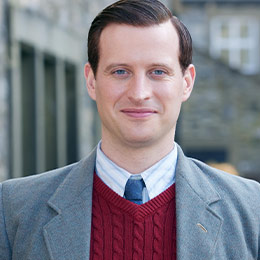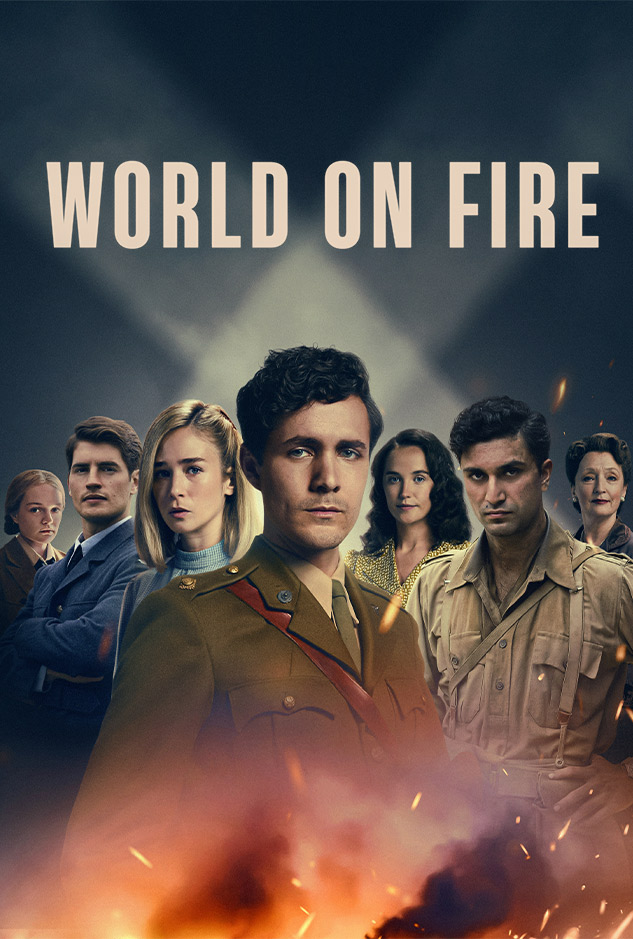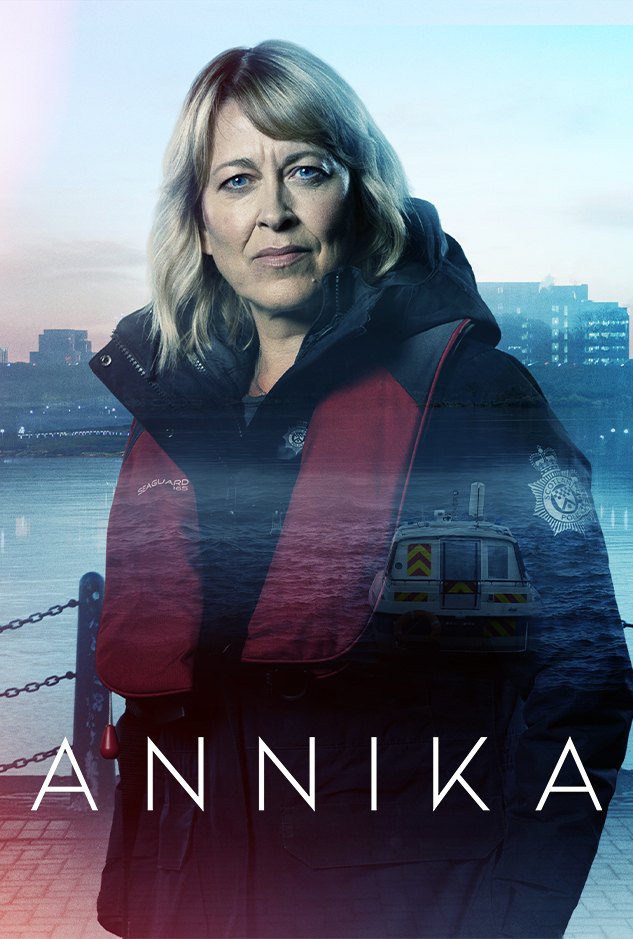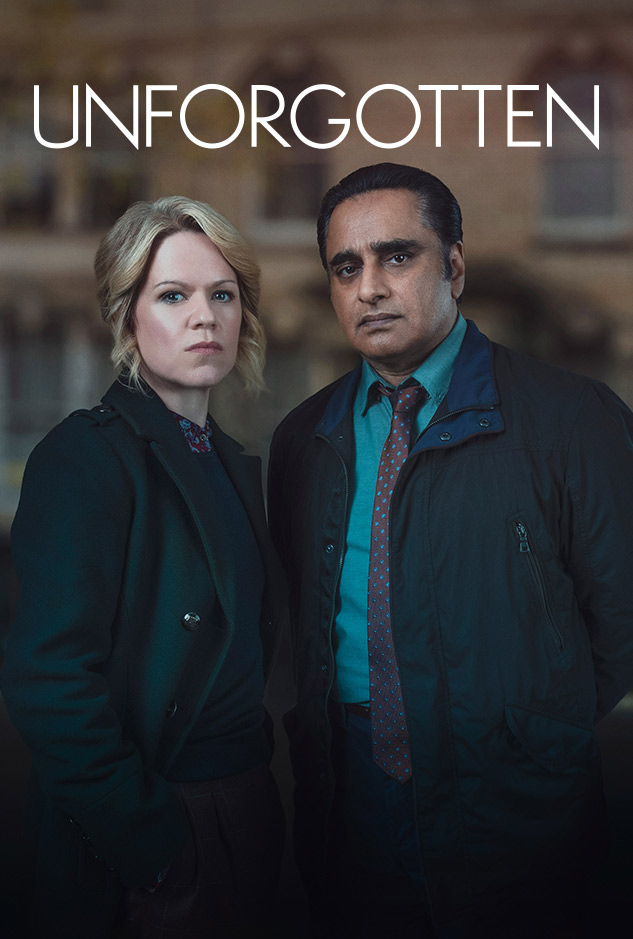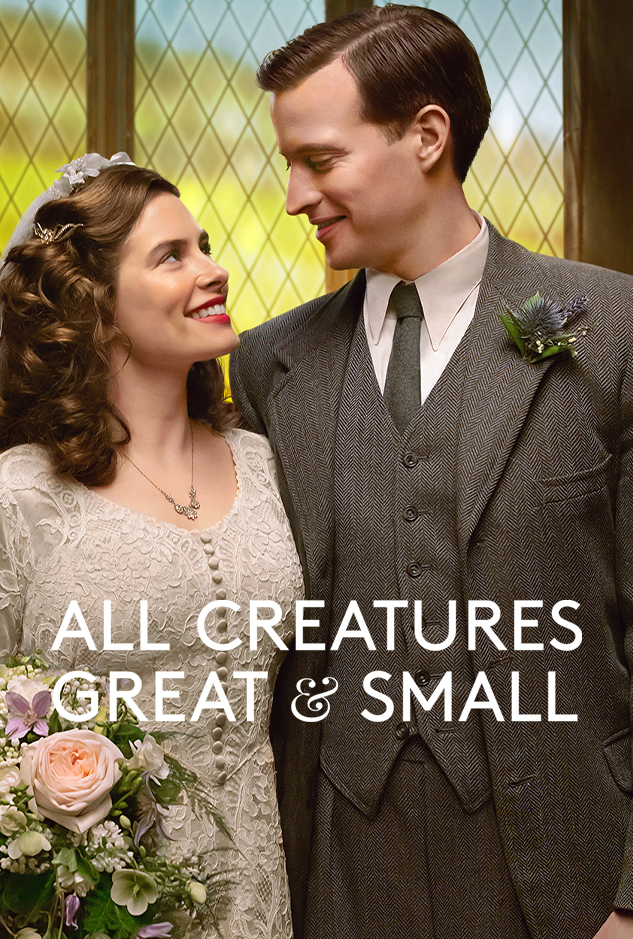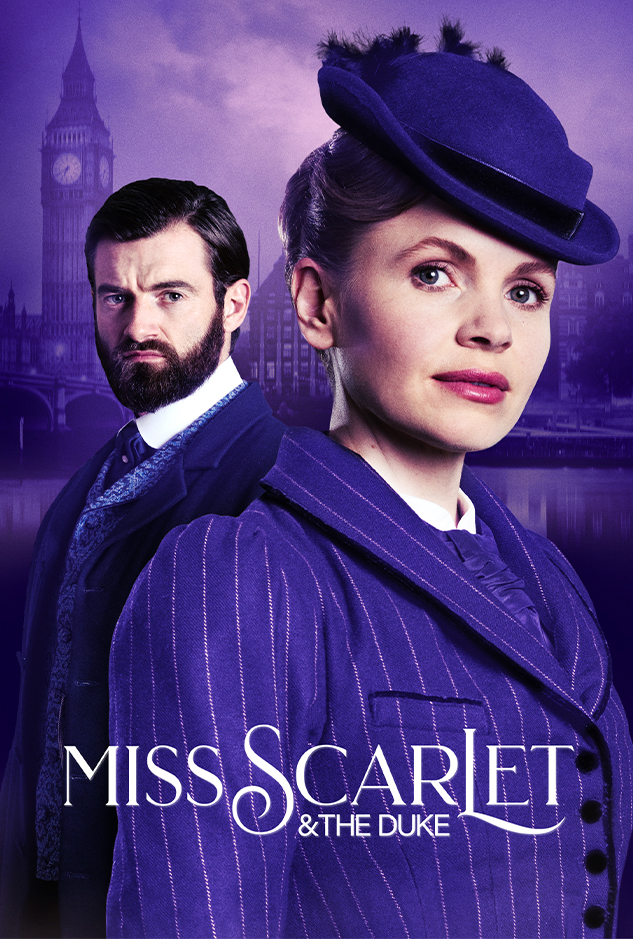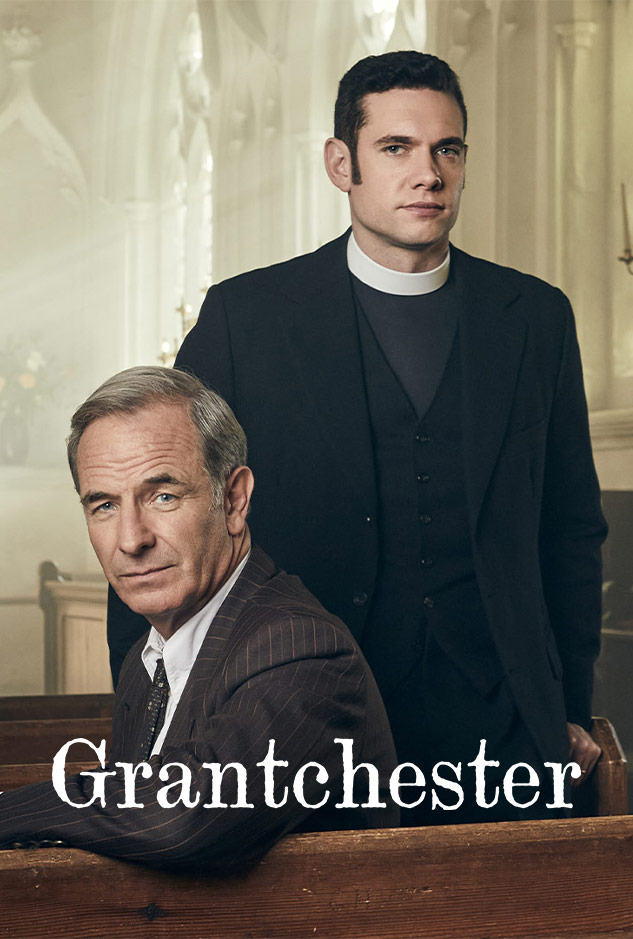Matthew Lewis Interview: Losing Himself in Hugh Hulton & Loving It
Actor Matthew Lewis, who won our hearts as Neville Longbottom in the Harry Potter films, is a contender for Helen Alderson’s heart as aristocrat Hugh Hulton in Season 1 of the 2021 All Creatures Great and Small. In an exclusive interview, Lewis describes losing himself in Hugh; shares insights into the character we want to dislike, but can’t; and reflects on his experiences in the show and with his craft.
Don’t miss more exclusives from Matthew Lewis—keep in touch by signing up for the MASTERPIECE Email Newsletter—so you can be among the first to learn any breaking news about All Creatures Great and Small, plus other MASTERPIECE shows we think you’ll love.
What do you like most about Hugh as a character?
The director, Brian Percival, and I were on the same page about him—we didn’t want it to be a very boring, two-dimensional, he’s a bad guy/he’s a good guy, she shouldn’t be with him/she should obviously be with him. I’ve played a love triangle similar to that before, and it ended up being a little sterile, and I didn’t find it as interesting as it could and should’ve been. So when they offered me the part, I said, “I’m keen to do it, but I have to insist that I don’t want to make him a villain,” and Brian was completely ahead of me, and he couldn’t agree more. The point is that he’s actually a really nice guy. Sure, he’s really wealthy and he comes from privilege and all the rest of it, but he’s not completely oblivious to that fact. Certainly, there’s parts of his upbringing that contribute to him missing the boat on certain things, but he’s not maliciously ignorant of his privilege. And he’s just as comfortable rubbing shoulders in the pub with the farmers as he is going down to state dinners at Westminster. And so, he is a genuinely nice guy. And that’s what I liked about Hugh and the story the most, because it rings true to me. It forces audiences to, I guess, pick a side, but it forces audiences to challenge themselves and to make their own minds up about things, and I like that.
What did you like most about playing Hugh?
The thing I liked about playing Hugh was that he’s very different from things that I’ve done before, and I was given a degree of freedom to explore and play around. The dialogue was such that you didn’t want to or need to change anything, but just little mannerisms and things that I tried—if it hadn’t been such a pleasant and accommodating environment, I might’ve been a bit more nervous to try things. So I was able to play around and try to squeeze out a few little funny bits and some charming bits and endearing bits.


Also, I enjoy losing myself in characters that are very unlike me, and Hugh was so different from me. I got to do an accent that I’ve always wanted to do. When I do my own accent and the character has similarities to me, I find the lines get blurred a little bit and it’s a constant battle to make sure I’m staying the character and not myself. Whereas when I can absolutely lose myself in an accent and a new character, that’s when I get to have fun. I can embody this person and play around. And when you’re totally in a scene, something will just happen and you go, “Whoa, that was amazing. I didn’t expect that to happen, but it felt real, it felt right,” and you get a real giddy feeling. I got a lot of that with Hugh.
How does Hugh see James? He’s so confident that it almost seems like he doesn’t even see James as a potential rival; James is sort of just this guy who was a part of the Andante tragedy, or this guy who is in the way of selling the bull and bringing Helen happiness. James isn’t invisible, but he’s kind of just another guy in the village…Or is he?
That is so accurate, because that is the one thing that I was going back and forth on for the entire series! I talked to all three of our directors about it, and I talked to Rachel about it, and I talked to Nick about it. It was this thing where my instinct was exactly as you described: his public school upbringing (or in America, private school), and belonging to a class—the landed gentry—would’ve instilled in him such a level of confidence, but not arrogance, that he would just not perceive someone like James to be a credible threat to him. It’s not as if he’s sized him up—he doesn’t even consider it. And he’s not an idiot, he’s incredibly intelligent. Obviously, he can be a bit bumbling in that way that wealthy people are when they don’t know certain things, don’t know how to change a car tire or whatever. But when it comes to other things, he’s incredibly intelligent. He might not be completely, fully emotional in tune, but he can spot things.


And so he does know that there is something about James. He knows that Helen likes him, he knows that James is a charming man, and a talented vet, and the talk of the town, and he starts to see these little bits, and that’s when we get this little inkling of doubt. But it never moves into genuine fear, it’s more a kind of I’m just going to set my stall out here, I’m not going to bare my teeth, but I’m just going to go and urinate over here to make sure he knows that this is my patch. It’s that kind of thing. So you’re absolutely right, it was trying to strike that balance between dismissing James as not a threat, and so being allowed to be friendly with him, not minding Helen seeing him, etc, but at the same time, slowly, over the last few episodes, developing a kind of Huh, I’m just going to keep my eye on this guy.
Did you enjoy working with these amazing racehorses in Episode 3?
Ah, it was incredible, brilliant. I got to work with animals all day. They say don’t work with children or animals, and if you want to get home early, then they’re right. But I absolutely adore animals, and having the privilege to be around them all day, on the farm and in the fair episode, when we had ferrets and rabbits and puppies and kittens, it was fantastic, it was a dream. And I love horses—I’ve ridden horses several times, but I won’t claim to be a horse rider. So being at the racecourse and seeing all these incredible creatures up close and being able to pet them and see them genuinely perform? It was incredible to watch, and see the intelligence in their eyes.
What was it like doing that scene where Hugh arrives to learn that Andante has been put down? The shock and rage and grief are so powerful.
My official first day was in Episode 2, when I meet James at the party—I’d come onto set at maybe 8pm and was done by 11…and then I didn’t come back again for a couple of weeks. So Hugh’s moment with Andante was effectively my first day, and I was very nervous about it, because it was such a big moment. The show is quite light and fluffy a lot of the time, and I think that’s why a lot of people like it. But that’s also juxtaposed with some genuinely quite emotive moments, and Andante is one of them, if not the biggest one. I remember saying to the producer beforehand, “This is going to shock some people. I mean, they’re probably going to think that there will be a stay of execution and James will save the day. When he actually pulls the trigger, that’s going to shock some people.”


I think it was brave. And I think it was important, because it’s real. When you show those contrasts, you heighten them both. It means the sad moments are more profound and the highs are more enjoyable, and I thought it was the right thing to do. With all that in mind, I just felt a tremendous amount of pressure to get it right. And so the first day, it was hard work. But weirdly, I think that with all that pressure of it being the first day, I used it a little bit and redirected the anxieties into grief, and used them as the emotions there.
What does Hugh’s relationship with Andante tell us about him as a character?
I think it’s really useful, as well, in terms of just talking about who Hugh is. As an owner of a racehorse, it’s easy to sort of assume that it’s just business, he’s callous and doesn’t really care about the well-being of the animals. I thought it was really crucial to show, straight off the bat, that no, this isn’t a heartless investor who just wants to run the horse into the ground—this was his baby. They were doing this together. He wasn’t just going to make money off this horse; the horse gave him as much as he gave the horse. If someone had said to him, “If you keep racing Andante, he’ll die,” he would’ve stopped him racing instantly, before you even finish the sentence. It wasn’t about the racing; it was about Andante.
I think that for people who love animals, straight away it says something about them as human beings, about their empathy and compassion. So I thought it was very clever to have that from the writers, that Hugh had this care and affection and passion for this horse that was his since he was a foal. And Soames, the guy who was entrusted to look after his stables, Hugh fired him immediately. He was furious. And it was really important that people didn’t think he was firing him because he’d lost an investment—he fired him because he had lost the thing that, outside of Helen, meant the most to Hugh.
When the stakes are high for Hugh in Episode 5, after it’s revealed to Helen that he’d tried to get Clive sold under false circumstances, he is suddenly, uncharacteristically, very vulnerable, declaring that he loves her. What was doing that scene like?
That was another of those instances where I can really thank my colleagues. We were all very close. None of us were locals to the actual area, even though I’m originally from Leeds, so a lot of us were all staying in the hotel together and we’d hang out outside of the shoot, and were very comfortable with each other. So Rachel and I worked on that scene before we got on set. In hair and makeup, or in the car on the way to work or whatever, we’d worked on it and talked in-depth about our motives and our feelings behind the words we were actually saying. And it’s really nice to have that sounding board as well, because I’d say, “I think this is what Hugh means,” and she’d go, “Yeah, yeah. What about this as well?” and I go, “Yeah, absolutely,” and vice versa. She was brilliant and generous…and that was really nice to have.


So I felt like once we’d got into it, I was as prepared as I could possibly have been. As I said earlier, I felt that I could lose myself in Hugh. Because was late on in the day—we’d already been doing other scenes all day—I was already into the moment, already into Hugh. We did the bit inside, where she stormed out, and then we moved outside and did the argument, which you don’t often get, outside of plays—you usually get dropped into a highly emotional scene without any kind of lead up to it. So this was quite nice, because I actually got to do all the first bit, when I got shouted at and I was embarrassed, and then I got to go straight into that bit. All that all gave me a bit of a boost…and I think it just gave it a little bit of a rawness, a vulnerability.
You talked about how an accent can help you lose yourself in a character. Was it a similar experience with the costumes and Hugh’s car?
So the whole thing happened very fast for me. I’d been approached for the role, and then spoke on the phone with Brian Percival, who said he’d love to have me do it. Because I’d not played anything like Hugh before, I said to him, “Can I send you a couple of scenes?” He said, “No, no, no, you don’t need to do that. No, you’ll be great.” I said, “I appreciate that, Brian, but can I send it for my own well-being? So that I know that if I’m doing this accent, I’m not going to turn up on the day and you’re going to go, ‘Is that how he’s going to speak?’ I just want to send you it in advance to give you an idea of how I see Hugh.” He said, “Fine, fine, fine,” so I sent him a couple of scenes. And then I didn’t hear anything for months. I thought, “Oh, God, was it that horrible?” I had to go and do reshoots on a film that I’d just done in New Zealand, so I left, still hearing absolutely nothing. And when I got back to New Zealand, the makeup lady, who I’d told about the role because she was a big fan of the original series, was like, “So are you doing it?” I was like, “I don’t know anymore.”
After, my wife and I landed back home in Florida 6am. We’d be flying for 24 hours, and I’d just got into bed, and my agent called just as I was dozing off and goes, “Right, yeah. All Creatures and Small. Can you be in London tomorrow?” I was like, “What? I’ve heard nothing, I thought they hated the tapes and I wasn’t doing it.” She’s like, “No, no, no, they’ve been busy casting some other roles and they’re really sorry it’s last minute, but can you be there tomorrow?” [A conversation followed with the producer, who convinced Matt to join them the day after the next.] I went to sleep, woke up the next day, booked a flight, flew into London, and then went straight from the airport to my costume fitting.
I was completely out of it, but then as soon as I’m in the costume fitting and we’re trying on the clothes, the white tie and the three-piece suit and the hat, it just got me so excited. Any period pieces, you put the clothes on, and it sort of reminds you why you got into acting, because it was to play make-believe—the same thing I used to do when I was a kid. I used to put on costumes and act out scenes from films, put my robe on and pretend to be Luke Skywalker—you put on the costume and go, “Yeah, this is it. I can be somebody else now.” So I was fit in the costume and then, literally the next night, I was in white tie doing the party scene. It was quite a whirlwind, and because I had so little time to prepare, I probably would’ve been a bit at sea without the costume. Thankfully, with the accent and the costume and the incredible period production design, it all helped get me out of jail a little bit, with the absolute tiny 36-hour prep time that I had!
About the car: It was a Riley, what was called a “pre-select,” which is almost like an automatic, would you believe? It’s really incredible piece of engineering, I’d never heard of one before and it was a dream, really pleasant to drive—especially, I think, in comparison to everyone else’s vehicle. I drove it a bunch of times, but then when we were doing that scene where we come together on the bridge, I was like, It’s quite narrow, that, and I’ve got to make sure I don’t make a mess of this. The stuntman had been doing a lot of the drone shots for me, and as he was getting out the car and handing it over, he said, “Yeah, yeah, I know, it is a bit nerve-wracking. I think someone just said it’s worth about 400 grand.” And I was like, “You could’ve told me that when we wrapped at the end of the day. Why have you told me that and you’ve just handed me the keys?” So, that was a bit of a handful!
But, once you get in the car and once you sit down…It’s very hard to describe to people who haven’t acted, it’s a thing that just happens, it might even be some kind of mental psychosis, I don’t know! But when you’ve done all your prep, and you know who he is, and what he is, and when you’re in that car and you feel the car and you’re in tune with all of his emotions—it sounds so pretentious—but you just kind of go onto autopilot and you’re no longer thinking about the words, they’re just coming out. It’s quite rare for me to get that. It’s like when everything just goes right. And when I hit it, it’s the most amazing, euphoric feeling afterwards when they yell cut and you go, Yes! I was in that. That was amazing. That wasn’t me at all, that was Hugh. Literally, Hugh was saying all that.
And then, when you don’t get it, that’s the worst. And that’s most of what I think I’ve established over the last 10 years, what acting’s about: When you don’t get that feeling, you’ve got to figure out why. Is it that you don’t have a motive? Or you’ve missed a crucial piece of the character, that’s not explaining why you’re saying these words? Or maybe it is the dialogue, maybe it’s just not something your character would say…Acting is really finding that, and there’s loads of things that have to come together, like a jigsaw—a jigsaw piece on its own is meaningless, but when it comes together, you see a piece of art, it’s like that. And you have to make sure that all the pieces are in there together and if one piece is missing, it’s not quite the full picture.
What’s nice about it is it kind of vindicates you. If you put all that work in, and you get that feeling, you go, “Yes, I know that I’ve done everything I needed to do for this role.” And then if you don’t get it, you know that you’ve dropped the ball somewhere, you’ve not done enough work, so that’s when you go back to the drawing board. It’s a really nice bellwether to just let you know whether you’ve done enough, or you haven’t done enough. And there’s roles I’ve done where I’ve not had that feeling and years later, still to this day, I kick myself and go, “You didn’t do enough there, and that’s why you didn’t get that feeling, doing that character.” I never went to drama school, so I’ve had to learn this all on the fly, and theater’s really helped me with that a lot…and I’ve had some wonderful directors and fellow actors that have sort of helped me with it over the years. It’s like riding a bike or playing bar chords on a guitar—you can’t figure out what it is, and then, suddenly, it happens and you go, “Damn, that’s how it’s meant to feel. That’s why people enjoy doing this.”
You describe joining the production when it was already in full swing. What was that like for you?
The cast, who’d been working together for about a month before I arrived, were all so, so welcoming, that it was very easy to get very comfortable very quickly. I feel like everybody who was involved in it bought into what it was supposed to be, what we want it to be, and we were all just pulling in the absolute same direction, which made it a really pleasant experience.
From what you’re saying, it sounds like the making of the series echoed the spirit of the series itself, which is so much about community and people coming together.
Yeah, very much so. It’s kind of hard to imagine now that we were doing this before Covid-19. You talk about community, and it’s what I think people are crying out for right now, when we can’t see our nearest and dearest as often as we’d like, or as close as we’d like. So yeah, it was very much a part of the cast—we all felt a responsibility to make it the best we could, which I think everyone usually does on a project like this. But it was also a very generous cast. I think that everyone wanted to make sure that in every scene, everyone was comfortable, everyone was telling their bit of the story that they wanted to tell in that particular scene, and space was made for them to tell it.
There was Nick, playing a lead role in his first job onscreen, just doing incredible. He asked a lot of questions, asked me questions and advice, and I’m like, “Mate, you don’t need advice from me, you are flying.” He was fantastic. Thinking of it now, I can’t believe it was his first major role! And he behaved like a lead actor, the way that he would come into work and he’d talk to everyone on set, cast and crew, he knew everyone’s names. It’s something I’ve noticed throughout the years: there’s a weight on their shoulders, as well as the director’s, to set the tone of the environment and make everyone feel comfortable. And despite being the one with the least experience out of all of us, Nick just seemed to get it.
And it was the same with everyone—everyone just wanted everyone else to be the best they could be, as well as themselves. It was a very selfless production.








